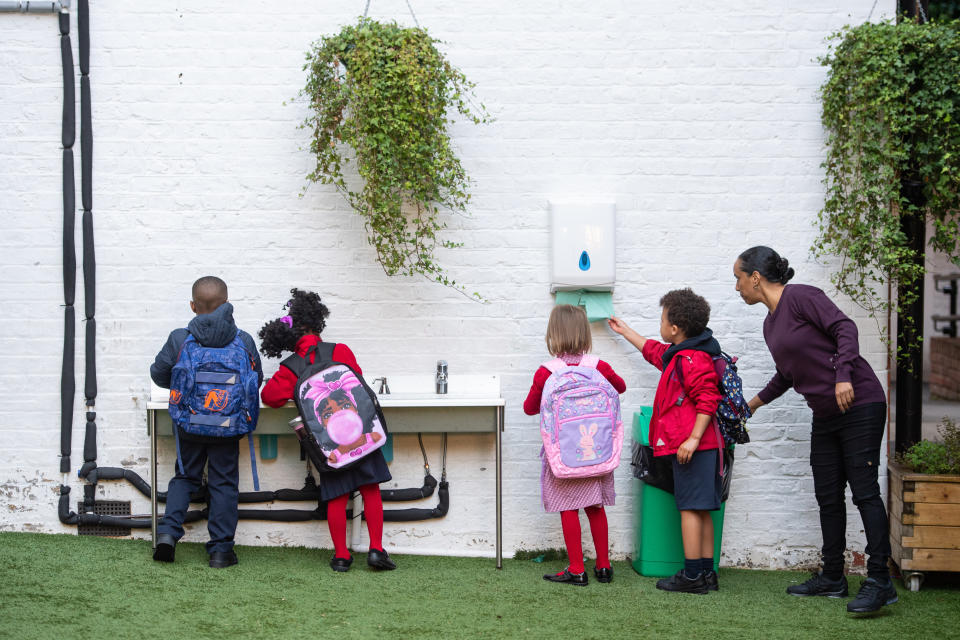Coronavirus: One in three parents says childcare has held back their careers

Almost a third of UK parents say childcare during the pandemic has set them back more than a year in their careers, according to a survey.
Business and charity leaders warn working parents now face new struggles despite the return to school, with a rise in partial school closures after outbreaks forcing some to stop working to look after self-isolating pupils.
Victoria Benson, chief executive of the Gingerbread charity, said two weeks’ unpaid time off for childcare would “push more single parent families into poverty.”
‘Back to school doesn’t mean back to normal’
A poll of more than 2,000 people by accountancy consultancy Theta, shared exclusively with Yahoo Finance UK, lays bare the scale of parents’ troubles since the coronavirus hit earlier this year.
It found 23% reported employers had been “unsympathetic” over their need to balance work with childcare so far. 27% of those surveyed feared their child not returning fully to school would put their job in jeopardy, because of the need to continue caring for them at home.
Two-thirds of the respondents, in a nationally representative sample which included non-parents, said parents had been the hardest hit by COVID-19 as they had been juggling work, childcare and home-schooling.
A separate survey by the Office for National Statistics (ONS) this week also highlighted the challenges of home-schooling before the summer break. 60% of parents polled in mid-June said their children were struggling to continue their education at home, with a lack of parental time tom support them one of the most common factors.
"The world of work has long presented additional challenges for working parents,” said Chris Biggs, managing director of Theta. “Lockdown has only made this issue worse for many who have not been given flexible working options, or who have had to take over home-schooling and childcare responsibilities.”
READ MORE: Job vacancies at ‘highest level since lockdown’
Biggs added: “The return of children to schools this September has created additional concerns that parents will have to change their plans quickly if and when they are forced to shut again or if they feel schools are not safe enough to continue.”
The latest official figures show 4% of state schools were not fully open on 17 September over suspected or confirmed outbreaks, up from 1% a week earlier. Around one in eight pupils was absent, though the figure includes absences for other reasons.
Charities echoed the warning, calling for more government support with childcare.
Jane van Zyl, CEO of work-life balance charity Working Families, told Yahoo Finance UK: “It’s becoming increasingly clear that ‘back to school’ doesn’t mean ‘back to normal’.”
“Many parents still don’t have access to the wraparound care they need. Coupled with local lockdowns and school closures, balancing work and care will still be a huge challenge for parents for the foreseeable future.”
Toll on women and single parents
Van Zyl said women were most likely to be dealing with such challenges, when they had already paid a “higher economic price” during the pandemic.
Research by the Institute for Fiscal Studies (IFS) in May found mothers were more likely than fathers to have left paid work since February, while those still in work were more likely to have seen a fall in hours.
The IFS survey of two-parent families found mothers also split almost half their working hours with other activities such as childcare, compared to less than one-third of fathers.
Victoria Benson, chief executive of single-parent family charity Gingerbread, said single-parent families faced even greater problems.
“Single parents do not have the flexibility that couple parents have and if a child is sent home from school, they have no option but to take unpaid time off to care for them or to home-school if they are isolating,” she said.
“In households with only one income any unexpected time off work can be financially devastating and in many areas where there is no rapid testing available, many will be forced to stay at home without an income for up to two weeks.”
READ MORE: UK government unveils ‘winter economy plan’ to save jobs and firms
The government announced plans to pay low-income households unable to work from home to self-isolate last month. But the scheme remains at a trial stage in north-west England, will only be expanded to whole areas with high infection rates, and only proceed if the trial brings down cases.
Single parents are also more likely to be facing an “uphill struggle to make ends meet,” added Benson.
“Too many single parents are working in insecure jobs and living on a financial knife-edge and many have seen their jobs disappear or their income drop in the last six months, while also seeing their costs increase due to having their children at home full time.”
The high costs of childcare have long been controversial and a major problem for many parents, despite the expansion of government-funded free schemes for young children in recent years.
Half of parents with young children polled last month by the Early Years Alliance said the government had not done enough to help parents access the childcare they needed during the pandemic.
Van Vzyl said more large-scale investment in childcare was crucial to “ensure we don’t turn the clock back on gender equality.” She added: “Like broadband and railways, childcare is crucial infrastructure.”

 Yahoo Finance
Yahoo Finance 